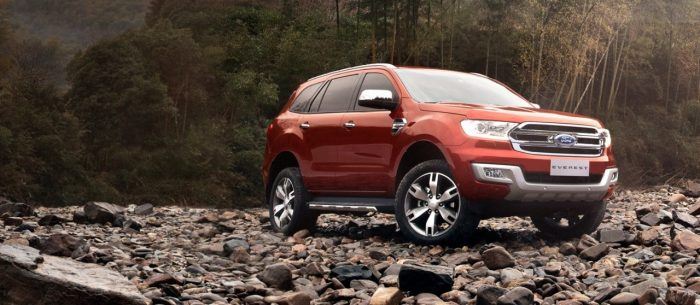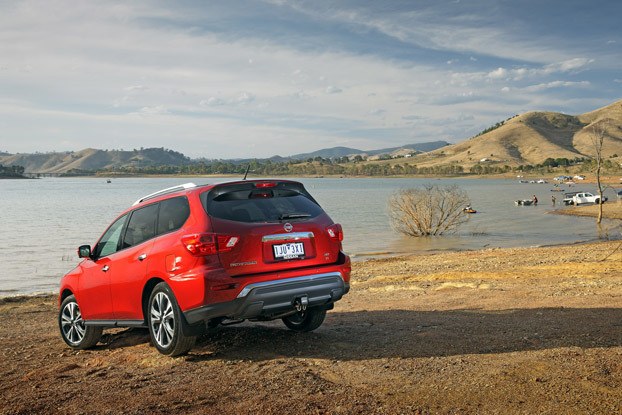Looking for the perfect vehicle to drive on your next Outback adventure with the family? We’ve got you covered by listing the five Best SUVs for exploring the Australian Outback.
The word “Outback” is used to describe the thinly populated regions of Australia. The Outback covers the area near Uluru/Ayers Rock and Alice Springs (commonly referred to as the “red center”), spanning several thousands of kilometers from north to south and east to west.
Since temperatures in the central deserts can go as high as 120F or 50°C on the hottest summer days, and drop to as low as 15F or -10°C on the coldest winter nights, you need a 4×4 vehicle that is tough enough to survive the extreme challenges in the Australian desert.
Here are five of the best SUVs that will allow you to enjoy the stunning scenery, colored sands, and glorious rocks and gorges that only the Australian Outback has to offer.
1. Ford Everest
First up is the brand spanking new Ford Everest. This SUV is powered by a 3.2-liter five-cylinder Duratorq diesel motor that churns out 192 horsepower and 347 lb-ft. of torque. It is equipped with seating for five or seven adults with a maximum payload of 757kg (1,668 lbs.), a maximum roof load of 100kg (220 lbs.), and a towing capability of up to 3000kg (6,613 lbs.).
The Ford Everest is also equipped with a Torque-On-Demand system that can automatically transfer torque between the front and rear wheels with the most grip, so you won’t find yourself stranded in the middle of nowhere when traversing over adverse terrain. This system can even send all the engine torque to a single wheel if the system detects the other wheels have zero traction.
And since the Australian Outback receives a surprising amount of rainfall, especially in the hot summer months, the Ford Everest’s maximum ground clearance of 225mm (8.85 inches) and maximum water wading depth of 800mm (31.5 inches) will get you home safely even in the presence of deep floods.
2. Nissan Pathfinder
The 2018 Nissan Pathfinder is available in 2WD and 4WD. It’s a known fact you don’t need the complexity and added weight of a four-wheel drivetrain to appreciate the splendor of the Australian Outback, but it certainly helps when faced with slippery and inhospitable terrain.
The base Pathfinder ST 2WD comes with a 3.5-liter, 270 horsepower petrol V6 connected to an Xtronic Continuously Variable Transmission or CVT. The Pathfinder ST 4WD comes with an intelligent 4×4 system with hill descent control to offer more grip and traction when you need it. Both models are equipped with seven adult-sized seats, Tri-Zone climate control, and Bluetooth connectivity so you can listen to AC/DC or Crowded House as you toddle along in the desert.
3. Mitsubishi Pajero Sport

The Mitsubishi Pajero Sport has an optional locking rear differential. Photo: Mitsubishi Motors Corporation.
Depending on where you live, the Mitsubishi Pajero Sport is also called the Montero Sport in some parts of the world. This vehicle comes well-equipped so you can head-butt Mother Nature into submission. This SUV comes with a 2.4-liter diesel motor equipped with MIVEC variable valve timing to maximize power and torque output. The engine is mated to an eight-speed automatic; the Super Select II 4WD system offers excellent traction on any type of terrain.
The base GLX trim only comes with seating for five but upgrading to the GLS trim will give you seven seats and a rear differential lock for added off-road toughness. Perhaps the only caveat with the Mitsubishi Pajero Sport are the unusual and polarizing rear taillights. They span from the top of the rear bumper all the way above the rear windshield.
4. Toyota Land Cruiser Prado
The Land Cruiser name is associated with toughness, durability, and all-terrain capability. The base model Toyota Land Cruiser Prado GX is motivated by a 2.8-liter turbo diesel mill connected to either a six-speed manual or six-speed automatic transmission. Four-wheel drive standard is across the range along with 17-inch alloy wheels, satellite navigation, and the Toyota Safety Sense package.
It also comes with a 150-liter fuel tank that is composed of an 87-liter main tank and 63-liter sub tank so you can spend more time exploring the Australian Outback and less time filling up.
5. Subaru Outback
What better way to discover the wild Outback than with the umm . . . Subaru Outback? First things first: this vehicle is not an SUV. It is a family station wagon based on the Subaru Legacy. But unlike ordinary SUVs, the Subaru Outback offers a bit more refinement along with the driving characteristics of a normal saloon. Sadly, Subaru’s outstanding symmetrical all-wheel drive system is only offered in the automatic versions (Lineartronic CVT) of the Outback.
The base model receives a 2.5-liter Boxer four-cylinder petrol engine that is good for 172 horsepower. The Subaru Outback 3.6R is motivated by a larger 3.6-liter Boxer six-cylinder motor that churns out 256 horsepower. Despite the car-like stance, this vehicle can effectively tow 1500kg (3,306 lbs.) while the 3.6-liter model can tow up to 1800kg (3,968 lbs.).
Conclusion
We specifically chose these five SUVs not only for their ability to survive the Australian Outback, but simply because they are stellar, go-anywhere vehicles that offer elevated levels of comfort and room for the entire family.
Alvin Reyes is the Associate Editor of Automoblog. He studied civil aviation, aeronautics, and accountancy in his younger years and is still very much smitten to his former Lancer GSR and Galant SS. He also likes fried chicken, music, and herbal medicine.
from Automoblog.net https://ift.tt/2JiFhSK




No comments:
Post a Comment